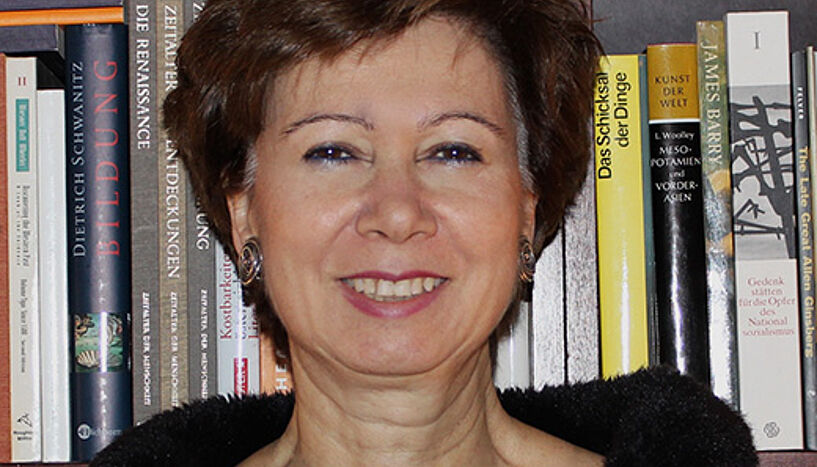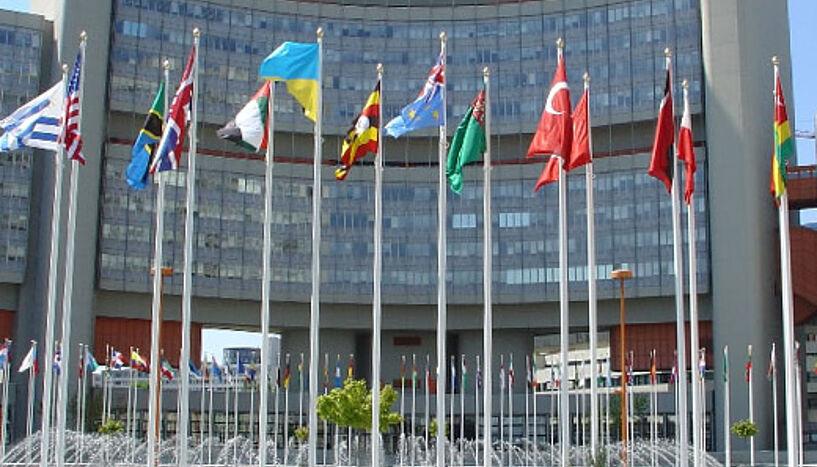Ayse Caglar: Moving Movement
| 20. Januar 2015
"I have always benefitted from other disciplines throughout my academic career", says Ayse Caglar, Professor at the Department of Social and Cultural Anthropology.
Istanbul, Montreal, Berlin, Florence, Budapest, and Göttingen – anthropologist Ayse Caglar has studied, lived and worked in all these cities. Now she is Professor at the Department of Social and Cultural Anthropology at the University of Vienna where she focuses on urban restructuring and migrants.
Once Ayse Caglar was asked by a colleague "When did you decide to become a scientist?", and she replied: "I never as such decided to become a scientist, I was interested in a variety of topics, moved academically along those interests and it just happened that I moved between disciplines and countries and became a scholar." The starting point of her career was the Bogazici University in Istanbul, where she studied Sociology. "This university is a well-known State University with an American system; it was quite competitive and academically differently structured than most European universities."
There she became interested in the Sociology of Knowledge, particularly on ideology. In order to pursue her interests she applied for MA programs of several universities abroad. In the end Caglar picked the McGill University in Montreal, because "I thought Montreal provided a unique combination of European and North American influences in its universities than other US or Canadian universities." Here just before completing her MA, she "switched" from Sociology to Anthropology, "but I have to say that I never really cared about the boundaries between the disciplines, I have always benefitted from other disciplines throughout my academic career." In Montreal she wrote her M.A. Thesis on a nationalistic group in Turkey.
Berlin – a city to stay
For her Ph.D. she wanted to pursue this theme in a broader context and went for a research trip to Berlin – a city which she should not leave for the next years. "In Berlin I met my husband and again it happened that I stayed in a very unplanned way, became a full-time lecturer at the FU Berlin and wrote my Dissertation about German Turks' quest for social mobility in Berlin and submitted to McGill. I also had my daughter around the time I wrote my dissertation, my son should come later when I was deeply into my habilitation," says Ayse Caglar and smiles. After being at two universities with an American system it took the anthropologist quite a while to get adjusted to the German system: "This completely different world at the university made me think a lot about the different academic traditions and legacies even within the same discipline. At the end, instead of simply resisting to what I was confronted in Germany – which I for sure did at the beginning – I started to see the merits of being exposed to such different systems and found it enriching despite its painful moments."
Combining Sociology and Anthropology
In her habilitation at the FU Berlin Ayse Caglar combined her two main subjects, and habilitated in both Sociology and Anthropology focusing on the everyday functioning of the nation-states in the texture of migrants' transnational practices. The salience but also the elusiveness of states in transnational social fields fascinated her. Not shortly after came a tailor-made job offer for Ayse Caglar: The Central European University in Budapest has just established a Department of Sociology and Social Anthropology and looking for a professor– a perfect fit for Caglar: "It was just one year after me and my familiy returned from Florence as a Jean Monnet fellow, thus another international move required some negotiation with the children who were just recovering from their immersion to different schools and languages." She and her family moved to Budapest, Ayse Caglar took the headship of the department and the first years of the MA and the Ph.D. program were put into action.
Vienna calling
After several years in Budapest establishing the new Department, Caglar interrupted her CEU years and moved on to Göttingen where she took the post as Research group director at Max Planck Institute for the Study of Multiethnic and multireligious Societies. "Despite the excellent working conditions at the MPI, our family dynamics – living in a small city not very suitable for international commuting, which has always been essential for us as my husband always commuted to where we moved to – made it very difficult for us to stay there. Therefore I was glad when I had the chance to become professor at the University of Vienna in 2011. So instead of returning to CEU we all moved to Vienna."
WWTF-project Cityscalers
"At the University of Vienna I had the chance to pursue the research I had started in Budapest, and Göttingen on urban restructuring and migrants." These themes are also part of her big research project "Cityscalers", which focuses on the interplay between urban renewal, incorporation of migrants and cultural diversity. It ran until the end of 2014 and allowed Ayse Caglar and her international team to analyze the relationship between migrants and the remaking, re-imagining and competitive repositioning of cities in the context of neo-liberal globalization. The research was conducted in Vienna, Berlin, Budapest, Linz, Essen, Pecs, and Marseille. "Again I learned a lot during this research in the sense that it moved my thinking of the topic towards empirical and analytical areas which I had not anticipated when I started the project. It pushed me to think about the basic categories of migration scholarship like mobility, the category of the migrant more critically and radically ", says Caglar, "Maybe we need to replace them with other concepts, like displacement."
The influence of movement
"Yes, of course", answers Ayse Caglar to the questions if her own movement and experience of living in various cities has influenced her academic work and research. "How could it not? It is very reflective when you have to explain to people around you – students, colleagues and academics with very different academic traditions – what you do and what your research interests are", she points out, "It is so important to not only talk to each other within the same canon. And I truly love questions from my students – especially from those who ask 'weird' questions beyond the canon and the jargon." (td)
Univ.-Prof. Ayse Caglar, since February 2011 Professor of Social and Cultural Anthropology, Department of Social and Cultural Anthropology, University of Vienna, holds her inaugural lecture "Migrants and cities: The spatial & temporal frameworks of migration scholarship & the challenges of Anthropology" on Monday, 26 January 2015, 18.00, in the Small Ceremonial Chamber (Kleiner Festsaal), University of Vienna.
Downloads:
UNI_Antrittsvorl_Caglar_END_4WEB_V2_01.pdf
Dateigröße: 94,31 KB



